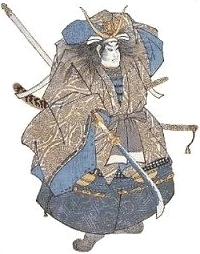
Image via Wikipedia
In the last blog post, I shared the old-school Japanese martial arts analogy of apprentice, journeyman, and master as it relates to social media. Here’s the quirk in that particular analogy: because social media as a field is new and evolving, there really can’t be any lifelong masters yet. So what’s a social media practitioner to do, and how does one become an expert?
Again, looking to the past to see into the future, there was a practice called musha shugyo, loosely translated as a warrior’s quest. Typically, after a samurai learned everything he could from a teacher, his teacher kicked him out of the school and forced the practitioner to go wandering the countryside, looking for opportunities to test his skills. The practitioner would look for warlords to serve, other schools to spar with, opportunities to put to use the skills he had learned under the tutelage of his teacher.
After the warrior quest ended, the practitioner would have a deep knowledge of their skills, tools, and contexts in which they could be helpful. The insights they gained during their years-long quests would serve to inspire them, and would eventually transform them into masters.
For social media practitioners, that’s more or less where we are. Once we’ve learned the basics of social media – blogging, podcasting, presence networks, etc. – we can pursue a few different options for our future.
Fishbowl
The most common and unfortunate option is to stay in the fishbowl, to continue talking to each other only, patting each other on the back for being cutting edge, and stagnating as we wait for the next shiny object to appear for us to flock to. In the process, we accomplish nothing and make an awful lot of noise. We fail to make any difference in the world, but think we do by talking constantly about it.
Arbitrage
Some practitioners choose the route of pursuing additional disciplines outside of social media, looking for knowledge, practices, and ideas to bring back into social media. This includes studying other forms of marketing, systems, operations, etc. so that the practices and ideas from other disciplines can be adapted to be useful in social media, something that Jay Moonah alluded to in yesterday’s blog post.
Musha Shugyo
The most productive of the practices a social media practitioner can do after learning and becoming competent at the basics is the musha shugyo, the testing period. Take the skills you have and apply them in real world contexts, for real world results. Look for opportunities to volunteer with charities, non-profits, or other organizations if your own company won’t give social media a try. Above all else, put the tools of social media to work, so you can see their power and limitations, what works, what bombs, and in what contexts each tool is appropriate.
The road to expertise, the road to mastery, is a long one, but a worthwhile journey. As social media continues to unfold and grow, the ability to do productive, useful things with the tools we have will continue to grow as well, if only we have the will to apply ourselves.
One final note. In Japanese culture, you never take the title of master – it’s culturally inappropriate. What happens, however, is that your students apply the title to you as their acknowledgement of all you have shared with them, and proudly refer to you as a master, an expert, etc.
In the West, in the 21st century, our obsession with branding and labels means that we often make bold claims we can’t back up, like social media expert, social media guru, etc. How do you know who is the real deal? Look to what their students and peers say about them, not what they say about themselves.
Ultimately, you’ll probably be the last to get the memo about being an expert. You’ll look back on your journey and see not social media, but lives saved, lives changed and improved, products and services bought and sold, brands built, communities bettered. The measurements that count most to you will likely have nothing to do with friends, followers, betas, or invitations, but with differences and positive changes made, accomplishments logged.
When you reach that point, I can only hope and work to be there by your side.
Did you enjoy this blog post? If so, please subscribe right now!
Get this and other great articles from the source at www.ChristopherSPenn.com



